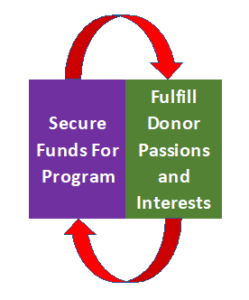“Why do I need to have a goal for every donor on my caseload?” the MGO asked. “And how does that fit with your philosophy that major gift fundraising is not about the money?”
Good question.
First, it’s important to note that there’s a dual purpose for every donor on every caseload, as illustrated below:

- There’s a need and responsibility to secure net revenue for program.
- There’s a need and responsibility to fulfill your donor’s passions and interests.
Notice I said, “dual purpose.” One is not more important than the other. They are equally important. If all you do is fulfill the interests and passions of a donor without developing net revenue for program – you have failed.
Jeff and I have seen a lot of situations where an MGO just “has to hang on to a donor” because “they love our mission and they care a lot” or some other reason. But the donor is not developing net revenue for program. This is not right.
So given that context, what’s the value of a financial goal for every donor?
A financial goal for every donor helps you to:
- Uncover how, and to what extent, the donor wants to express their passions and interests with your organization – Some donors want to be involved to a far greater level than you’re asking them to. But unless you have the discussion, you’ll never know. A goal pushes you to find that level of interest and involvement. We’ve seen so many situations where a donor was giving at a $5,000 a year level, but when a goal was set for a higher amount, the donor responded by giving more and getting more involved. Conversely, if the goal is set too high, the MGO quickly learns where that line is as well. It’s good to know.
- Focus your activity – A goal helps you tier your donors and know how to use your time, and what strategy to use with each donor.
- Plan – It begs you to answer the question “how are you going to achieve the goal?” So many MGOs fail at their jobs because they don’t have an individualized plan for every donor on their caseload. If you have a goal, you must create a plan to reach that goal. (Tweet it!)
- Know if you’re on plan – If you have a goal, and you cash flow that goal according to the pattern and history of the donor, as the year progresses you’ll know whether you’re on- or off-plan with that donor. This is important since it keeps your timing with the donor tuned to the donor’s sequencing and schedule.
- Align the organization’s need for funds with the donor’s wants and desires – A goal helps you stay on track with your organization’s need for net revenue to run the important programs that it has.
There are so many important values related to goal-setting. And all of us here at Veritus feel very strongly about having a goal for every donor, for the reasons I’ve listed above.
So be sure you set a goal for every qualified donor on your caseload. And keep in mind that the path to getting the money is serving the passions and interests of your donor.
Securing the money is a result, not an objective.
Richard
PS — We have a great (free) White Paper on the subject of creating goals and plans for every donor. Click here to download it.







Greetings Richard and Jeff,
Great topic as usual! I would like to offer a different view of the following portion of your article based on my experience.
“First, it’s important to note that there’s a dual purpose for every donor on every caseload…
1. There’s a need and responsibility to secure net revenue for program.
2. There’s a need and responsibility to fulfill your donor’s passions and interests.
Notice I said, “dual purpose.” One is not more important than the other. ”
Actually, I have found that one purpose is more important than the other, especially with major-level donors – the need to fulfill your donors passions and interests. It’s an intrinsic human trait to seek what makes us feel good about ourselves – FIRST. It may sound selfish, egotistical, or self-centered, but it is true; the first driving motivator to carry out a charitable act is to get a warm, fuzzy, feel-good high about doing good. And that’s fine! If giving made donors feel put-out, bothered, or annoyed they simply would avoid doing so. The world would be full of Ebeneezer Scrooges!
So, I have found success in tilting the scale of “need to secure net revenue” and “need and responsibility to fulfill your donor’s passions and interests” slightly in favor of the donor’s passions and interests. If the donor nets a “feel good profit” when they give, they are more likely to give again and to give a little more each time.
Just my thoughts. Thanks for all you do for us out here in the wild world of nonprofits.
Cheers,
Andrew Whitman
Corporate & Foundation Relations Specialist